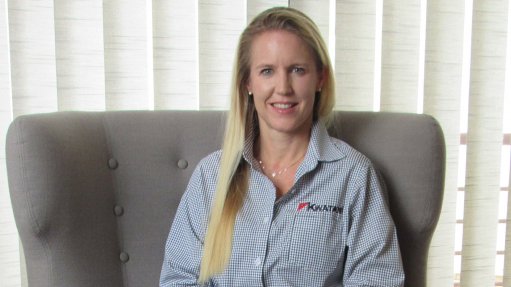
Kwatani CEO Kim Schoepflin
JOHANNESBURG (miningweekly.com) – Industrial and mining vibrating screens manufacturer Kwatani has achieved a level-1 broad-based black economic empowerment (BBBEE) score and is 51% black women-owned.
This BBBEE accreditation affords significant benefits to its mining clients that can claim 135% of money spent on Kwatani. Additional BBBEE benefits also arise from procuring from a majority black-owned company, as well as procuring from a black female-owned company, Kwatani CEO Kim Schoepflin told Mining Weekly Online on Thursday.
The Mining Charter, released in September, stipulates, among other requirements, that 70% of mining goods procured by mines must be locally manufactured and Kwatani, as a South African original-equipment manufacturer (OEM), scores highly on this requirement.
Additionally, Kwatani also works with its suppliers, who are mostly small, local companies, to improve their empowerment ratings in addition to managing the quality of its supplies. This is also done to ensure the long-term sustainability of its suppliers, who are not always aware of empowerment scores or how they can improve them.
Schoepflin highlighted that Kwatani's supply chain contributes to its BEE score and is fostered by collaboration with suppliers on their transformation efforts and supporting the growth of small businesses through its procurement spend.
"Better empowerment benefits everyone in the supply chain. The uncertainty in the local mining industry has been ameliorated by the release of the Mining Charter in the final quarter of 2018, and we expect to see some investment in new equipment by mines, specifically bulk commodity mines, such as coal, manganese and iron-ore," she said.
Kwatani's value chain, education and empowerment initiatives demonstrate the company's commitment to growing business opportunities in South Africa and supporting small industrial businesses, she added.
However, the company is also receiving greater volumes of enquiries from African and international projects and has vibrating screens operating in Russia and North America. It expects, and will pursue, greater international demand and aims to grow into an international OEM with its production hub in South Africa.
"We produce some of the biggest vibrating equipment and solutions in the world and our solutions, designed for arduous conditions on African mines, have ensured that our name is carried across the world by leading mining houses."
The company has invested significantly in its production facilities and manufacturing capacity and has achieved an International Standards Organisation 9001:2015 quality accreditation.
Schoepflin emphasised that the company's employees are its most important asset and that there are continuous skills development plans in place at the company. These skills development initiatives are informed by its operational needs, as well as the interests and aspirations of its personnel.
"Our commitment to transformation includes internship programmes in collaboration with universities for young black engineers, as well as a training and placement programme for disabled people.
"Further, our social commitment focuses on education and specifically on supporting black teachers in mathematics and sciences," said Schoepflin.
"The learners are placed on site at our operations or off site at partner companies. This provides them with workplace experience and helps to produce work- and industry-ready personnel."
Similarly, the company is fostering its future leaders and has personnel who are reading for their MBAs and others reading for their masters in engineering.
Meanwhile, new engineering technologies and tools, as well as new manufacturing tools and equipment, require Kwatani to continuously train and develop its staff.
"We have invested significantly in our in-house skills and our biggest investments have been our operations and our engineering capabilities. Better design and engineering are necessary for better tailor-made solutions as the demands of our clients evolve. Our focus is on improving throughput and supporting continuous tonnage for our clients. This places greater strain on the machines and requires meticulous engineering to meet the new parameters, while maintaining a low cost of ownership and long life of the machines."
Kwatani has also invested in its research and development facilities and has a fully fledged materials testing laboratory with which it can test customer products and ores and develop equipment ideally suited to beneficiate those materials. Similarly, the company has developed condition monitoring solutions, Schoepflin said.
Further, while the company's empowerment rating will be of greatest relevance for local mines, its industrial clients, which include food, chemical and wastewater companies, can also benefit from its empowerment rating.